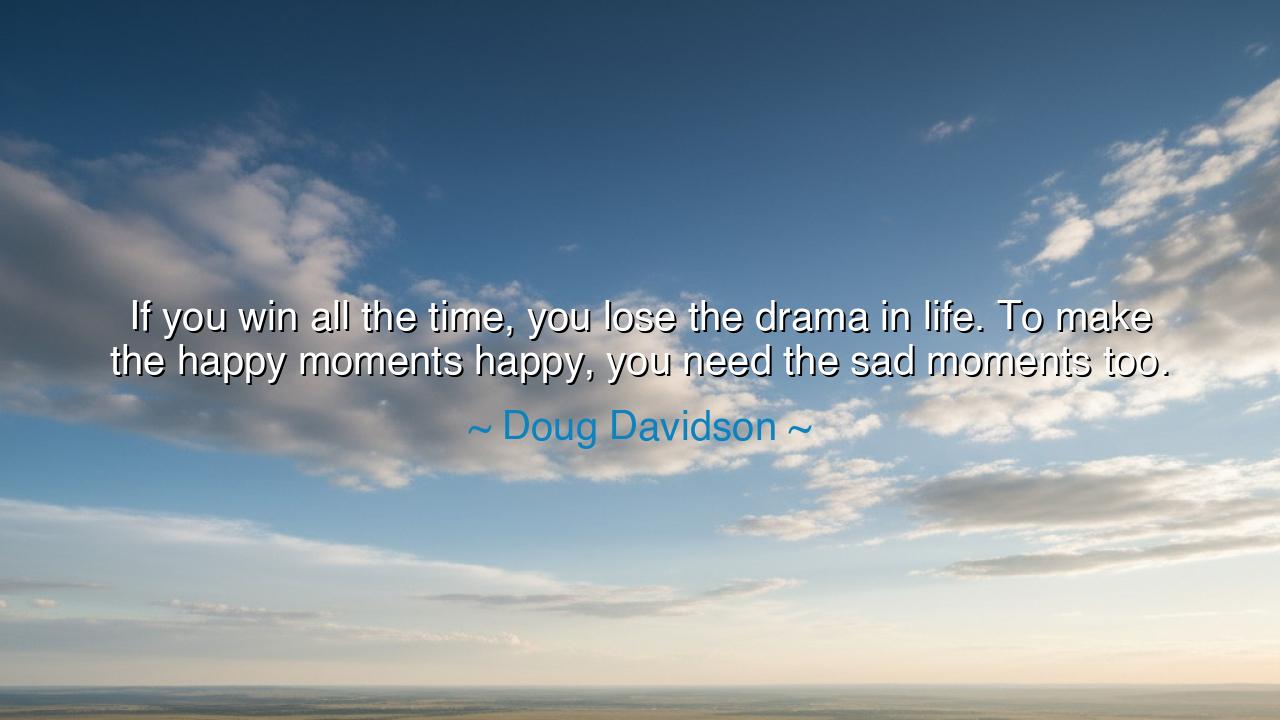
If you win all the time, you lose the drama in life. To make the
If you win all the time, you lose the drama in life. To make the happy moments happy, you need the sad moments too.






The words of Doug Davidson ring with ancient balance and eternal wisdom: “If you win all the time, you lose the drama in life. To make the happy moments happy, you need the sad moments too.” In this saying, he reveals the paradox of existence—that joy cannot be understood without sorrow, that triumph is hollow without defeat, and that the drama of life itself springs from the contrast of light and shadow. Without pain, happiness has no savor; without struggle, victory has no meaning.
The ancients spoke often of this balance. The Greeks called it pathos and catharsis, the mingling of suffering and release that made tragedy not a tale of despair, but a lesson in humanity. They knew that the heart grows deeper through sadness, and that without sorrow, happiness becomes bland, like honey without hunger. The philosophers taught that fortune turns like a wheel: at one moment lifting men to glory, at another casting them down into grief. To accept this rhythm is to live wisely, to reject it is to live in delusion.
History itself provides countless examples. Consider the life of Abraham Lincoln. He endured crushing defeats, profound depression, and unbearable loss—yet these sad moments forged within him the compassion and resilience that later allowed him to guide a divided nation. Had he only ever won, his victories would have been shallow, his leadership brittle. But because he knew sorrow, he could taste the sweetness of triumph and use it not for himself but for the healing of millions.
Even the realm of art teaches us this truth. The composer Beethoven gave the world symphonies of transcendent beauty, but it was his suffering, his deafness, his despair, that infused his music with power. The joyous tones of his Ninth Symphony are not joyous because they are free of pain—they are joyous because they rise above it. Without the depth of sadness, the height of happiness could never have been so sublime.
Davidson’s words also warn us against the illusion of constant victory. To “win all the time” may sound like paradise, but it strips life of meaning. Imagine a play in which no conflict arises, or a story in which the hero never struggles. Such tales are empty, for the soul is moved only when it witnesses both fall and rising again. So it is with our own lives. Without loss, we cannot value gain. Without sadness, joy passes us by unnoticed. The drama of life is its contrasts, and it is this drama that shapes the human spirit.
The lesson, then, is not to curse sorrow when it comes, nor to despise failure, but to understand them as necessary parts of the whole. The sad moments carve space within the heart, making room for greater joy. They temper pride, sharpen gratitude, and teach humility. To deny them is to deny the fullness of life itself. He who only seeks constant triumph loses not only the drama, but the very wisdom of existence.
Practical action is clear: when you fall, do not despair but see it as part of the pattern; when you are sad, remember that joy is being prepared for you; when you suffer, know that you are being shaped for greatness. And when you win, let gratitude be doubled, for you have known what it is to lose. In this way, both sorrow and happiness will serve you, not as enemies and friends, but as twin teachers guiding your path.
So let us remember Davidson’s wisdom: the happy moments shine only because the sad moments exist beside them. Life’s beauty is not in unbroken triumph, but in the drama of rise and fall, of sorrow and joy interwoven. Embrace both, and you will taste the fullness of what it means to be human.






AAdministratorAdministrator
Welcome, honored guests. Please leave a comment, we will respond soon